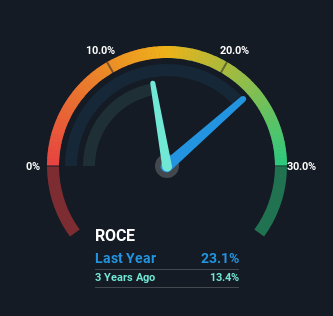- United Kingdom
- /
- Construction
- /
- AIM:BILN
Investors Shouldn't Overlook Billington Holdings' (LON:BILN) Impressive Returns On Capital

To find a multi-bagger stock, what are the underlying trends we should look for in a business? One common approach is to try and find a company with returns on capital employed (ROCE) that are increasing, in conjunction with a growing amount of capital employed. If you see this, it typically means it's a company with a great business model and plenty of profitable reinvestment opportunities. Speaking of which, we noticed some great changes in Billington Holdings' (LON:BILN) returns on capital, so let's have a look.
What Is Return On Capital Employed (ROCE)?
For those that aren't sure what ROCE is, it measures the amount of pre-tax profits a company can generate from the capital employed in its business. The formula for this calculation on Billington Holdings is:
Return on Capital Employed = Earnings Before Interest and Tax (EBIT) ÷ (Total Assets - Current Liabilities)
0.23 = UK£9.1m ÷ (UK£71m - UK£32m) (Based on the trailing twelve months to June 2023).
So, Billington Holdings has an ROCE of 23%. That's a fantastic return and not only that, it outpaces the average of 12% earned by companies in a similar industry.
Check out our latest analysis for Billington Holdings

Above you can see how the current ROCE for Billington Holdings compares to its prior returns on capital, but there's only so much you can tell from the past. If you'd like, you can check out the forecasts from the analysts covering Billington Holdings here for free.
What The Trend Of ROCE Can Tell Us
Billington Holdings is displaying some positive trends. Over the last five years, returns on capital employed have risen substantially to 23%. The amount of capital employed has increased too, by 64%. So we're very much inspired by what we're seeing at Billington Holdings thanks to its ability to profitably reinvest capital.
On a separate but related note, it's important to know that Billington Holdings has a current liabilities to total assets ratio of 45%, which we'd consider pretty high. This can bring about some risks because the company is basically operating with a rather large reliance on its suppliers or other sorts of short-term creditors. While it's not necessarily a bad thing, it can be beneficial if this ratio is lower.
Our Take On Billington Holdings' ROCE
All in all, it's terrific to see that Billington Holdings is reaping the rewards from prior investments and is growing its capital base. Since the stock has returned a solid 57% to shareholders over the last five years, it's fair to say investors are beginning to recognize these changes. With that being said, we still think the promising fundamentals mean the company deserves some further due diligence.
Billington Holdings does come with some risks though, we found 3 warning signs in our investment analysis, and 1 of those is a bit concerning...
Billington Holdings is not the only stock earning high returns. If you'd like to see more, check out our free list of companies earning high returns on equity with solid fundamentals.
Valuation is complex, but we're here to simplify it.
Discover if Billington Holdings might be undervalued or overvalued with our detailed analysis, featuring fair value estimates, potential risks, dividends, insider trades, and its financial condition.
Access Free AnalysisHave feedback on this article? Concerned about the content? Get in touch with us directly. Alternatively, email editorial-team (at) simplywallst.com.
This article by Simply Wall St is general in nature. We provide commentary based on historical data and analyst forecasts only using an unbiased methodology and our articles are not intended to be financial advice. It does not constitute a recommendation to buy or sell any stock, and does not take account of your objectives, or your financial situation. We aim to bring you long-term focused analysis driven by fundamental data. Note that our analysis may not factor in the latest price-sensitive company announcements or qualitative material. Simply Wall St has no position in any stocks mentioned.
About AIM:BILN
Billington Holdings
Through its subsidiaries, provides structural steel and construction safety solutions in the United Kingdom and Europe.
Flawless balance sheet established dividend payer.
Market Insights
Community Narratives



